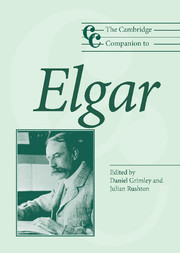Book contents
- Frontmatter
- 1 Introduction
- 2 Elgar and his British contemporaries
- 3 Elgar and his publishers
- 4 Magic by mosaic: some aspects of Elgar's compositional methods
- 5 Elgar's musical language: the shorter instrumental works
- 6 The early choral works
- 7 Elgar's later oratorios: Roman Catholicism, decadence and the Wagnerian dialectic of shame and grace
- 8 Roman Catholicism and being musically English: Elgar's church and organ music
- 9 ‘A smiling with a sigh’: the chamber music and works for strings
- 10 In search of the symphony: orchestral music to 1908
- 11 The later orchestral music (1910–34)
- 12 Elgar's unwumbling: the theatre music
- 13 Elgar and recording
- 14 Broadcasting's ally: Elgar and the BBC
- 15 Elgar in German criticism
- 16 Functional music: imperialism, the Great War, and Elgar as popular composer
- Notes
- Select bibliography
- Index
15 - Elgar in German criticism
Published online by Cambridge University Press: 28 September 2011
- Frontmatter
- 1 Introduction
- 2 Elgar and his British contemporaries
- 3 Elgar and his publishers
- 4 Magic by mosaic: some aspects of Elgar's compositional methods
- 5 Elgar's musical language: the shorter instrumental works
- 6 The early choral works
- 7 Elgar's later oratorios: Roman Catholicism, decadence and the Wagnerian dialectic of shame and grace
- 8 Roman Catholicism and being musically English: Elgar's church and organ music
- 9 ‘A smiling with a sigh’: the chamber music and works for strings
- 10 In search of the symphony: orchestral music to 1908
- 11 The later orchestral music (1910–34)
- 12 Elgar's unwumbling: the theatre music
- 13 Elgar and recording
- 14 Broadcasting's ally: Elgar and the BBC
- 15 Elgar in German criticism
- 16 Functional music: imperialism, the Great War, and Elgar as popular composer
- Notes
- Select bibliography
- Index
Summary
‘If we had nothing but Elgars, then there might be an end to conservatories, and our theory teachers might lose their entire earnings.’ Thus wrote not an irate member of Britain's musical establishment but an admiring German critic, Max Hehemann, one of several early twentieth-century German musicians to write articles about Elgar in musical periodicals. The period of German interest in Elgar in the years immediately following the successful Düsseldorf performances of The Dream of Gerontius in 1901 and 1902 was relatively brief: as Michael Kennedy has observed, Elgar came ‘at the end of an epoch in European music, at the dawn of a renaissance in England’, with the result that he soon ‘ceased to exercise the European musician's curiosity’. But soon is not immediately: in this short period Elgar's works received an acclaim outside Britain they have not known since. The criticism that exists therefore offers us valuable insights into Elgar at a time when the composer was at his creative peak, but from outside British musical society, and thus from outside the cultural-political battleground of the British musical renaissance within which the critical discourse on Elgar's music took place. Consequently, we can examine afresh the commonly held idea of Elgar as a musical embodiment of ‘Englishness’, not least the extent to which the composer's Englishness was perceived as compatible with his Catholicism. Before doing so, however, we must first become acquainted with the critics themselves.
- Type
- Chapter
- Information
- The Cambridge Companion to Elgar , pp. 204 - 213Publisher: Cambridge University PressPrint publication year: 2005



